Facebook was a mess. The independence it dangled to close acquisition deals with Instagram and WhatsApp turned the company into a tangle of overlapping products. Every app had its own messaging and Stories options. Economies of scale were squandered. Top innovators led mature products already bursting at the seams with features while new opportunities went unseized.
Facebook was effectively drowning in its own success because the different arms couldn’t coordinate to paddle in the same direction.
But today Facebook announced its biggest reorganization ever, which could cut the redundancy, apply talent to fresh problems and unite the company under a common banner.
Putting the family first
Chris Cox, Facebook’s chief product officer, will fly that flag. He now oversees the “Facebook Family of Apps,” including Facebook, Messenger, Instagram and WhatsApp. Messenger’s VP of Product Stan Chudnovsky will take over as head of Messenger, replacing David Marcus, who’s moving to lead a new blockchain group at Facebook (more on that later).
Facebook’s head of News Feed Adam Mosseri is taking the Instagram VP of Product role, taking over for Kevin Weil, who’s going to Marcus’ project. Mosseri is replaced by Facebook VP of Product Management John Hegeman. Meanwhile, Facebook’s head of Internet.org Chris Daniels will take the lead role at WhatsApp, recently vacated by Jan Koum as he departed the corporation altogether.
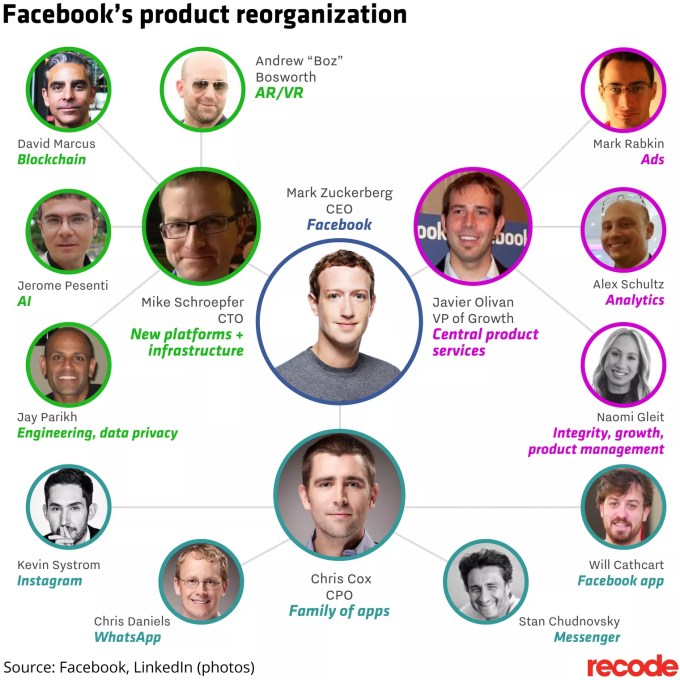
These changes could reduce the autonomy of Instagram and WhatsApp, at least in philosophy if not in formal hierarchy. That might make them less appealing places to work, after WhatsApp veterans like Nikesh Arora were passed over in favor of an installed Facebook exec. It could spook future acquisition candidates, who might see the reorganization as Facebook reneging on its promise of independence. And it could hinder the apps’ role as hedges against harm to Facebook’s core brand. Many users don’t realize they’re owned by Facebook, and therefore didn’t extend to them the backlash about recent privacy scandals.
But Facebook will gain the ability to execute a more coherent strategy. Mosseri, a long-time member of Mark Zuckerberg’s inner circle, will bring to Instagram his experience turning News Feed into one of the world’s most popular inventions as Instagram is hoping to ramp up monetization now that it’s achieved utter dominance over Snapchat in photo sharing. Few know the Facebook playbook better than Mosseri, who could help Instagram get out ahead of problems he’d been in the thick of, like fake news and declines in original sharing.
Daniels’ days connecting the developing world fits well at WhatsApp, whose users across the globe often deal with slow mobile networks. This also leaves room for new blood at Internet.org. It’s now connected 200 million people to some form of the internet, but its Free Basics app has been banned in several countries over net neutrality concerns and partners have pulled out over sustainability concerns. WhatsApp, too, is ready to monetize, having recently launched its WhatsApp for Business product, and Daniels’ background in biz dev and partnerships at Facebook around the IPO could serve him well.
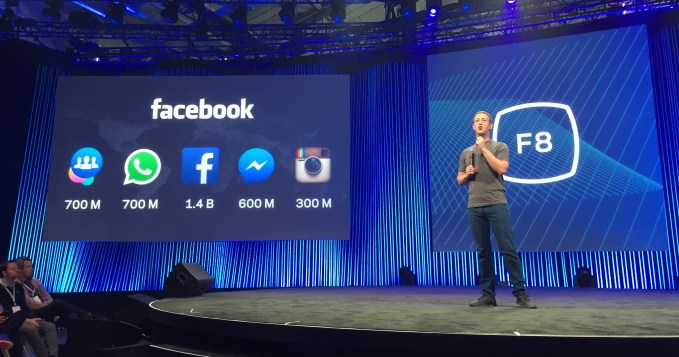
But more important than their siloed efforts is what a more unified family under Cox could accomplish. Over 2016 and 2017, all four apps launched isolated Stories products. While Instagram’s and WhatsApp’s took off, Facebook’s and Messenger’s felt absurdly redundant and underpopulated. It took until late 2017 for Facebook to realize it should synchronize Stories across Instagram, Facebook and Messenger so users could post once to their audiences everywhere.
The reorg could prevent Facebook from haphazardly tripping over itself in an attempt to seize on emerging trends. As visual communication becomes the new Facebook mandate, the company could similarly align its efforts in augmented reality, ephemeral and encrypted messaging and e-commence tools. Mosseri and Daniels can implement the Facebook strategy and shield their apps from the same old pitfalls. Instagram and WhatsApp have instituted themselves in their respective markets, and now have the leaders to make them well-oiled cogs in the Facebook machine.
Move fast and shake things up
Few hires have had the impact at Facebook of Marcus and Weil. The former president of PayPal, Marcus has brought Messenger from 200 million monthly users in 2014 to more than 1.3 billion now. He successfully managed the forced migration of users off Facebook’s chat feature to Messenger, laid the foundation for advertising and business tools and turned the app into a platform for games and useful utilities (beyond the initially half-baked bots).
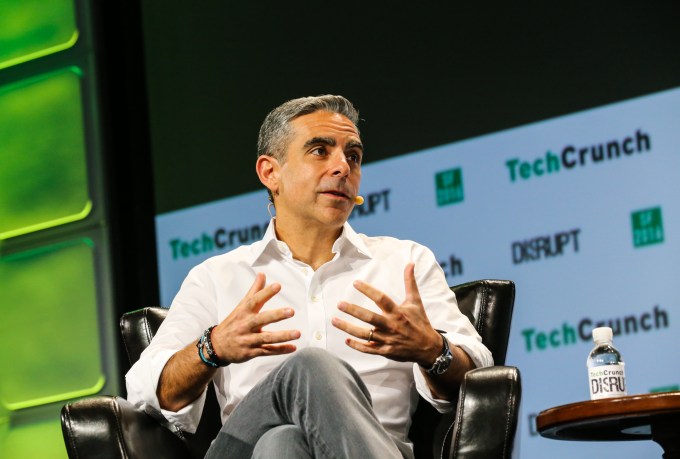
Weil, formerly SVP of Product at Twitter, where changes came at molasses pace, turned Instagram into a rapid-fire launcher of new features. Most significantly, he implemented Zuckerberg and Instagram CEO Kevin Systrom’s plan to copy Snapchat’s Stories. Instagram was growing stale, showing just the occasional highlights of users’ lives. Instagram Stories solved that, and Weil grew it to more than 300 million daily users — much bigger than Snapchat’s whole 191 million user audience. Meanwhile, using Stories to spark conversation, Instagram Direct grew into one of the most popular messaging apps.
But today, Messenger and Instagram have begun to feel bloated. Marcus had to announce a plan to simplify the chat app at the start of 2018 after its version of Stories, called Messenger Day, steamrolled the rest of the product’s design. The camera, games and bots got as much space in the navigation bar as the core chat product. Last week Messenger revealed a redesign that refocuses on… messaging, giving the app a sensible roadmap. Instagram, now having effectively won the Stories war with Snapchat and having acclimated users to an algorithmic feed, left Weil without as many urgent changes to make.
If Facebook wasn’t careful, it could have lost these leaders to the CEO or COO role of a growing startup, or seen them leave to launch something of their own. Marcus had already taken a board seat at crypto giant Coinbase, while Weil took one at exercise community Strava.
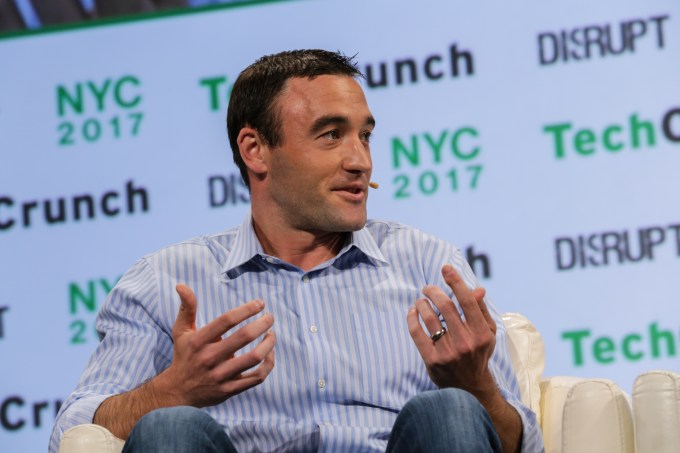
That’s why it was so wise to give Marcus the latitude to build a new team of fewer than a dozen, including Weil, focused on finding how Facebook could take advantage of the blockchain. It’s a massive, open new problem space in which to operate. One that needs visionaries in both product and business.
It’s unclear what they’ll build together, but there are plenty of opportunities.
They could explore payments facilitated by the blockchain’s lack of transaction fees. Messenger and Instagram both added native payment systems recently. Cutting out the credit card companies could be a lucrative shot for Facebook. And micropayments could open new ways to tip creators or compensate news outlets. Cloud storage based on blockchains could help Facebook cut its massive server bills. And the decentralized nature of the blockchain might unlock new paradigms for social networking with increased autonomy that might threaten Facebook if invented elsewhere.
Perhaps they’ll conclude Facebook doesn’t need the blockchain. That’s fine. The risk would be leaving the space unmined and ripe for someone else’s taking.
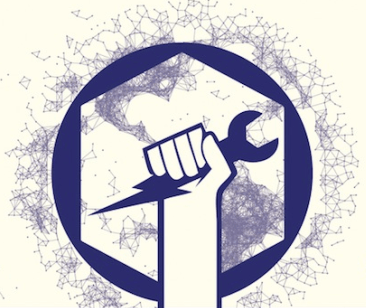
Facebook has lasted this long by identifying new threats of disruption, and thwarting them with its build, buy or copy strategy. Streams like FriendFeed and Twitter? Facebook built News Feed. Photos and chat? Facebook bought Instagram and WhatsApp. Ephemeral content? Facebook copied Snapchat.
The reorganization recognizes how Facebook had become a danger to itself — disruption through internal redundancy and wasted chances. It saw the discombobulated wings of Google lead it to massive failure in messaging, with a half-dozen chat apps all competing while confusing users. And it saw how internet giants like Microsoft and Apple ignored social because it was outside their wheelhouse, only to end up sharing the titan’s table with Facebook.
Zuckerberg loves to say the journey is 1 percent finished. Today Facebook proved it’s always looking for a new finish line.































Comment